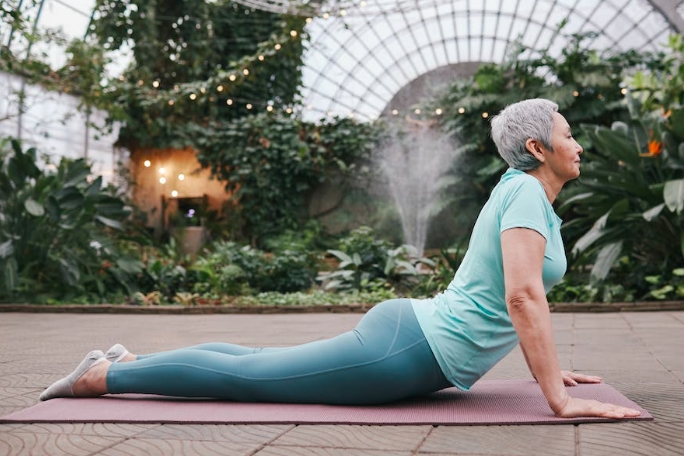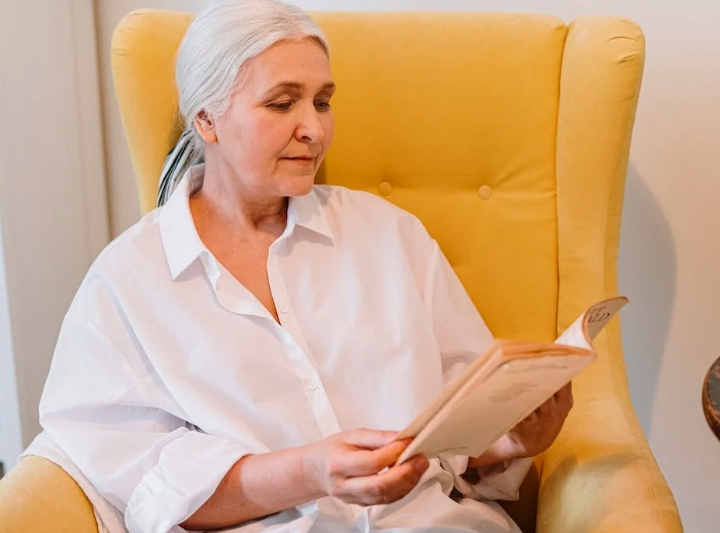As we age, our health becomes increasingly important. We must take extra steps to ensure we stay healthy and maintain our quality of life. Age Gracefully: A Guide to Senior Health is designed to provide seniors with the information they need to stay healthy and age gracefully. This guide covers topics such as diet, exercise, mental health, and managing chronic conditions. It also provides helpful tips and advice on how to remain independent and make the most of life. Additionally, the guide offers ways to stay connected to family and friends, as well as ways to remain socially active.
Age Gracefully: A Guide to Senior Health is essential reading for any senior who wishes to age gracefully and remain as healthy as possible. It provides a comprehensive overview of the key issues that seniors must consider in order to maintain their health and well-being. Through this guide, seniors can gain an understanding of the importance of diet, exercise, and other lifestyle factors, as well as the potential risks associated with certain conditions. Additionally, the guide helps seniors learn how to manage their health and remain independent, while still being able to enjoy life.
Age Gracefully: A Guide to Senior Health is an invaluable resource for any senior who wants to remain as healthy and active as possible. By following the tips and advice outlined in this resource, seniors can ensure they age gracefully and remain independent. This guide is essential reading for all seniors, as it provides important information on how to maintain health and make the most of life.
Nutrition and Diet
Nutrition and diet are essential components of a healthy lifestyle. Eating a balanced diet helps to ensure that the body has the nutrients it needs to function optimally. Eating a variety of foods from the five food groups is recommended to get all the necessary nutrients, vitamins, minerals, and fiber. It is important to ensure that our intake of calories, fat, sugar, and salt is kept within the recommended guidelines.

Seniors have different nutritional needs than younger people, and require extra attention when it comes to their diet. They need to consume a balanced diet, with an emphasis on higher amounts of protein and calcium, as well as other vitamins and minerals. Vitamin B12 and Vitamin D are particularly important for seniors, as they can help to prevent anemia, improve cognitive functions, and reduce the risk of osteoporosis.
Here are some tips for healthy eating:
– Eat plenty of fruits and vegetables, including dark leafy greens. These are high in vitamins, minerals, and fiber.
– Include lean proteins in your diet such as fish, poultry, and legumes.
– Choose whole grain carbohydrates such as whole wheat bread, brown rice, and whole grain cereals.
– Reduce your intake of saturated fat, trans fat, and added sugars.
– Drink plenty of water throughout the day to stay hydrated.
– Monitor your salt intake, as too much can lead to high blood pressure.
– Don’t skip meals, and try to maintain regular eating schedules.
– Eat smaller portions, and avoid overeating.
– Speak to a doctor or dietitian if you have any questions or concerns about your dietary needs.
Exercise and Physical Activity
Exercising and engaging in physical activities can have many benefits for seniors. Regular physical activity can help improve overall health and fitness, reduce stress, increase energy levels, and improve mobility and balance. It can also reduce the risk of falls, improve sleep, and reduce the risk of certain chronic health conditions such as diabetes, heart disease, and osteoporosis.
Types of Physical Activities Suitable for Seniors
There are many types of physical activities suitable for seniors, including walking, swimming, low-impact aerobics, strength training, yoga, and tai chi. Walking is an excellent way to stay active, as it can be done almost anywhere and requires no special equipment. Swimming is also a great choice, as it is a low-impact activity that is easy on the joints. Low-impact aerobics is a great way to get your heart rate up and get some exercise in. Strength training can help maintain and increase muscle mass, which can help with balance and mobility. Yoga and tai chi are both excellent activities for increasing flexibility, balance, and coordination.
How to Stay Motivated
Staying motivated to exercise and stay physically active can be difficult, especially for seniors. It can help to set realistic goals and break them down into smaller, achievable steps. It can also be helpful to find an activity that you enjoy, as this can make it easier to stick with it. It can also be helpful to exercise with a friend or in a group setting, as this can make exercise more enjoyable and give you a sense of community. Finally, it can be helpful to reward yourself for reaching your goals and celebrate your successes.
Exercising and staying physically active can have many benefits for seniors, and there are many types of activities that are suitable for seniors. Walking, swimming, low-impact aerobics, strength training, yoga, and tai chi are all great choices. To stay motivated, it can help to set realistic goals and find an activity that you enjoy. It can also be helpful to exercise with a friend or in a group setting, and to reward yourself for reaching your goals. With the right motivation and a little bit of effort, exercise can be an important part of a healthy lifestyle for seniors.
Sleep
Sleep is an essential component of good health and a key factor in overall wellbeing, especially for seniors. The National Sleep Foundation recommends 7-8 hours of sleep a night for adults, and no more than 10 hours. However, seniors have unique sleep needs and may require more or less sleep than the recommended amount. It is important for seniors to develop healthy sleep habits, such as setting a consistent sleep schedule and creating an environment conducive to sleep. Additionally, regular exercise and activity during the day can help improve sleep quality. Seniors should also monitor their sleep, tracking habits and patterns, and consulting with a doctor if waking up is difficult.
Sleep is beneficial for seniors in many ways. It can improve cognitive function, memory, and mood. It can also reduce the risk of chronic diseases and injuries. However, there are a number of factors that can interfere with sleep for seniors, such as medications and medical conditions, stress, limited daylight, and changes in sleep cycle. It is important for seniors to recognize these factors and take steps to address them so they can achieve the recommended amount of sleep and take advantage of its many benefits.
Mental Health
Mental health is an important factor in the wellbeing of seniors. It is essential to recognize the common mental health issues in this population so that they can be addressed in a timely and appropriate manner. This paper will discuss the importance of mental health for seniors, identify common mental health issues in this population, and provide tips for maintaining good mental health.
Importance of Mental Health for Seniors
Mental health is an essential element of wellbeing for seniors. Mental health has a direct impact on a person’s physical health and can influence their ability to function in everyday life. Maintaining good mental health allows seniors to make informed decisions, cope effectively with stress, and engage in meaningful activities. It also helps to reduce the risk of developing chronic physical conditions, such as diabetes or heart disease.
Common Mental Health Issues in Seniors
There are a number of common mental health issues that affect seniors. These include depression, anxiety, substance abuse, and cognitive decline. Depression is a common mental health issue among seniors and is often characterized by feelings of sadness, hopelessness, and worthlessness. Anxiety can manifest itself in feelings of restlessness, fear, and worry. Substance abuse among seniors is often linked to the misuse of alcohol, prescription drugs, and over-the-counter medications. Cognitive decline can lead to confusion, forgetfulness, and difficulty concentrating.
Tips for Maintaining Good Mental Health
There are a number of steps that seniors can take in order to maintain good mental health. They should make sure to get enough sleep, exercise regularly, and eat a healthy diet. They should also stay socially active and connected with family and friends. It is also important for seniors to engage in activities that bring them joy and to find ways to cope with stress and anxiety. Finally, if any mental health issues arise, seniors should seek professional help.
Medications and Supplements
Importance of Medication Management
Medication management is an important part of health care for seniors, as it helps ensure that elderly patients are taking the right medications at the right doses. Proper medication management also helps prevent negative drug-drug interactions and ensures that seniors are taking medications that will not negatively interact with other medications they may be taking. Additionally, medication management helps ensure that seniors are taking medications for the right duration and are not at risk for an overdose or an underdose.
Common Medications for Seniors
Common medications that seniors take include cholesterol-lowering drugs, blood pressure medications, diabetes medications, anticoagulants, and pain medications. Many seniors take multiple medications each day to manage multiple chronic health conditions. It is important that seniors and their caregivers understand the purpose of each medication and how to properly take them to ensure the best possible outcomes.
Supplements that May Be Beneficial
In addition to medications, many seniors take supplements to help improve their health. Supplements such as omega-3 fatty acids, vitamin D, and calcium can help seniors maintain healthy bones and muscles. Probiotics can help support healthy digestion, while elderberry can help support a healthy immune system. Additionally, some supplements, such as ginkgo biloba, can help support cognitive health. It is important that seniors talk to their doctor before taking any supplements to ensure that they are safe and will not interact negatively with any medications that the senior may be taking.
Hygiene and Safety
Importance of Good Hygiene
Good hygiene is essential for maintaining the health and safety of all people, but especially for seniors. It is important to practice good hygiene to prevent the spread of germs and bacteria, as well as to keep the body clean and healthy. Good hygiene also helps to protect seniors from illnesses, infections, and other health issues. Additionally, good hygiene can help to maintain a positive outlook, as it can make a person feel more confident and self-sufficient.
Tips for Maintaining Hygiene
When it comes to maintaining good hygiene, it is important to practice regular handwashing, as well as to shower or bathe regularly. In addition, seniors should practice good oral hygiene, including brushing their teeth at least twice a day and flossing daily. It is also important to wear clean clothes and to make sure to change them regularly, as well as to use deodorant and other products to keep the body smelling fresh.
Safety Tips for Seniors
When it comes to safety, it is important for seniors to take steps to protect themselves from falls and other accidents. This includes making sure that their home is free from clutter, that the stairs are well-lit, and that handrails are installed in the bathroom. Additionally, seniors should make sure to wear proper footwear with good support and traction, and to use assistive devices such as canes and walkers when needed. It is also important for seniors to have regular checkups with their doctor, as this can help to identify any health issues that may need to be addressed.
Health Conditions and Illnesses
Common Health Conditions in Seniors
Seniors are more prone to certain health conditions and illnesses due to their age. Common health conditions and illnesses that affect seniors include cardiovascular diseases, diabetes, dementia, arthritis, chronic obstructive pulmonary disease (COPD), stroke, cancer, and depression.
Cardiovascular Disease: Cardiovascular disease is a broad term that covers all heart and blood vessel diseases. It is the leading cause of death in the United States, and is particularly common in seniors. Symptoms of cardiovascular disease can include chest pain, shortness of breath, and an irregular heartbeat.
Diabetes: Diabetes is a chronic condition that occurs when the body either doesn’t produce enough insulin or doesn’t respond to insulin properly. It is one of the most common chronic diseases in seniors and can lead to serious health problems such as heart disease, stroke, and kidney failure. Symptoms of diabetes can include frequent urination, extreme fatigue, and blurry vision.
Dementia: Dementia is a group of diseases that affects thinking, memory, and behavior. It is a common condition in seniors and can lead to confusion, difficulty communicating, and impaired judgment.
Arthritis: Arthritis is a chronic condition that causes joint pain, swelling, and stiffness. It is one of the most common chronic conditions in seniors and can lead to difficulty performing everyday activities.
Chronic Obstructive Pulmonary Disease (COPD): COPD is a group of diseases that cause difficulty breathing. It is a common condition in seniors and can lead to coughing, wheezing, and chest tightness.
Stroke: Stroke is a condition that occurs when blood flow to the brain is interrupted. It is a common condition in seniors and can lead to paralysis, speech difficulties, and confusion.
Cancer: Cancer is a group of diseases that occur when abnormal cells grow and divide uncontrollably. It is a common condition in seniors and can lead to fatigue, pain, and changes in appetite.
Depression: Depression is a mental health disorder that causes persistent feelings of sadness and loss of interest in activities. It is a common condition in seniors and can lead to changes in sleeping patterns, difficulty concentrating, and thoughts of suicide.
How to Manage and Prevent Health Conditions
Seniors can manage and prevent the health conditions listed above by making healthy lifestyle choices. Eating a balanced diet, exercising regularly, and getting adequate sleep can help seniors stay healthy and manage existing conditions. It is also important for seniors to keep up with regular check-ups and screenings, as early detection is key to managing and treating many chronic conditions. Additionally, seniors should be aware of common signs and symptoms of the conditions listed above and contact their doctor if they suspect they may have one.
It is also important for seniors to stay mentally and socially active. Participating in activities such as reading, playing games, and interacting with family and friends can help seniors stay healthy and reduce the risk of developing certain conditions. Additionally, seniors should stay up-to-date with their vaccinations to help protect against certain illnesses.
Finally, seniors should be aware of the medications they are taking and make sure to take them as prescribed. Unnecessary medications can increase the risk of developing certain health conditions and can interact with other medications, so it is important to talk to a doctor before taking any new medications.
Preventive Health Care
Definition and Importance of Preventive Healthcare
Definition
Preventive healthcare is a type of medical care that focuses on the prevention of illness, disease, and injury through the promotion of healthy lifestyles, immunizations, and screening tests. By taking proactive steps to maintain health and wellness, preventive healthcare can help to reduce the risk of developing chronic conditions such as heart disease, stroke, diabetes, and cancer.
Benefits
The benefits of preventive healthcare are numerous: it can reduce the risk of developing serious medical conditions, lower medical costs in the long run, improve quality of life, and increase life expectancy. Additionally, preventive healthcare can help to identify medical conditions early on, when treatment is most effective.
Recommended Screening Tests and Immunizations
Screening Tests
Screening tests are important for early detection of various medical conditions, such as high blood pressure, cancer, and diabetes. It is recommended that adults receive regular screening tests for these conditions, as well as others such as cholesterol and HIV. Additionally, adults should receive routine physicals and eye exams.
Immunizations
Immunizations are also an important part of preventive healthcare. It is recommended that adults receive routine immunizations, such as the flu shot, tetanus, and pneumonia vaccines. Additionally, adults should receive immunizations for diseases such as measles, mumps, and rubella.
Tips for Staying on Top of Preventive Care
Schedule Regular Appointments
It is important to schedule regular appointments with your healthcare provider in order to receive the preventive care services you need. This includes routine physicals, immunizations, and screening tests.
Adopt a Healthy Lifestyle
Adopting a healthy lifestyle is also an important part of preventive care. This includes eating a balanced diet, exercising regularly, getting adequate sleep, and avoiding smoking and excessive drinking.
Know Your Family History
It is also important to be aware of your family medical history. Knowing your family medical history can help you and your healthcare provider to identify potential health risks and take steps to prevent them.

End of Life Planning
End of life planning is an important process for all individuals to consider, as it provides individuals with the opportunity to plan for their future care and make decisions about their medical care before they are unable to do so. End of life planning can provide peace of mind for individuals and their families, as it helps to ensure that decisions are made in accordance with the individual’s wishes and values.
Advance Directives and Legal Documents
Advance directives are legal documents that individuals can use to specify their wishes for medical care and end-of-life decisions. Advance directives allow individuals to make decisions about their care ahead of time, and can provide guidance for family members and medical professionals. Additionally, individuals can use advance directives to appoint a healthcare proxy or power of attorney, who can make decisions on their behalf if they are unable to do so.
Hospice and Palliative Care
Hospice and palliative care can provide comfort and support to individuals at the end of life. Hospice and palliative care providers are trained to support individuals and their families as they go through the end-of-life process. Hospice and palliative care providers can also help individuals to understand their options and make informed decisions about their care.
End-of-life planning is a process that can provide individuals and their families with peace of mind. Advance directives, legal documents, and hospice and palliative care can all provide individuals with the support and guidance they need to make decisions about their care at the end of life. Planning ahead can help to ensure that individuals’ wishes are respected and that their families are supported.
Conclusion
Ageing gracefully is a lifelong journey. No matter how old you are, it is never too late to start taking care of your physical, mental, and emotional health. Regular exercise, healthy eating, and taking time to relax and enjoy life can make a huge difference in how you feel and look. With the right combination of lifestyle habits and support from your healthcare team, you can age gracefully and enjoy a healthy, active, and fulfilling life.
By taking time to focus on your health and wellbeing, you can stay healthy and active for years to come. Whether it’s through regular check-ups with your doctor, or taking a walk or attending an exercise class, taking care of yourself is an important part of aging gracefully.
Ultimately, the goal of aging gracefully is to enjoy your life to the fullest and make the most of the years you have left. With the right combination of lifestyle habits and support from your healthcare team, you can age gracefully and enjoy a healthy, active, and fulfilling life. So take a deep breath, embrace the aging process and enjoy every moment of it.
FAQs
1. What are the most important ways to age gracefully?
The most important ways to age gracefully include staying active, eating a healthy diet, maintaining a healthy weight, managing stress, getting regular health screenings, and staying socially connected.
2. What foods are best for seniors to eat?
Eating a balanced diet that includes plenty of fruits, vegetables, whole grains, and lean proteins is key for seniors. Aim to limit added sugars, processed foods, and unhealthy fats.
3. What are the benefits of physical activity for seniors?
Physical activity for seniors can help improve strength and balance, reduce the risk of falls, and improve overall health and well-being. It can also help reduce stress, combat depression, and improve sleep.
4. What is the best type of exercise for seniors?
The best type of exercise for seniors is one that is tailored to their individual needs and abilities. This can include low-impact activities such as walking, swimming, and yoga.
5. What are the signs of a healthy senior lifestyle?
Signs of a healthy senior lifestyle include feeling energized, having a positive outlook, staying physically active, eating a nutritious diet, staying socially connected, and managing stress.
6. What are some tips for managing stress in seniors?
Tips for managing stress in seniors include engaging in activities that bring joy, talking to friends and family, staying socially connected, participating in activities that bring a sense of purpose, and making time for relaxation.
7. What is the importance of mental stimulation for seniors?
Mental stimulation is important for seniors as it helps to keep their minds sharp and can prevent cognitive decline. Activities such as reading, doing puzzles, playing games, and socializing with friends can help seniors stay mentally engaged.
8. How can seniors stay socially connected?
Staying socially connected is important for seniors. They can stay connected by joining a senior center, attending social events, joining a book club, or participating in activities with their peers.
9. What are the benefits of joining a senior group?
Joining a senior group can provide seniors with a sense of community, social support, and companionship. It can also help reduce stress and improve mental and physical health.
10. What are the dangers of being isolated for seniors?
Isolation in seniors can lead to loneliness, depression, and an increased risk of health problems such as heart disease, stroke, and cognitive decline.


















